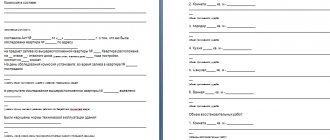Home / Eviction / Why send a notice of eviction from an apartment (sample attached)?
In some situations, it becomes necessary to evict a tenant from an apartment, hostel or house who has lost the right to use it. The procedure is simplified if he agrees to voluntarily vacate the square meters. Otherwise, you will have to go to court.
This means that you will have to prepare to file a claim, but first you need to use such a tool for pre-trial dispute resolution as a notice of eviction from the apartment.
State duty for recognition of ownership of residential premises (apartment):
- up to 20,000 rubles - 4 percent of the claim price, but not less than 400 rubles;
- from 20,001 rubles to 100,000 rubles - 800 rubles plus 3 percent of the amount exceeding 20,000 rubles;
- from 100,001 rubles to 200,000 rubles - 3,200 rubles plus 2 percent of the amount exceeding 100,000 rubles;
- from 200,001 rubles to 1,000,000 rubles - 5,200 rubles plus 1 percent of the amount exceeding 200,000 rubles;
- over 1,000,000 rubles - 13,200 rubles plus 0.5 percent of the amount exceeding 1,000,000 rubles, but not more than 60,000 rubles.
Rationale:
The requirement for recognition of property rights is of a property nature, is subject to assessment and is subject to state duty in accordance with paragraph 1 of Part 1 of Art. 333.19 Tax Code of the Russian Federation.
Features of deregistration at the place of residence
Depending on the situation, the deregistration procedure has certain features. Let's consider the possible options in more detail.
Not residing
If it is necessary to discharge people who do not actually live in the apartment, two options are possible:
- The citizen does not mind being discharged, but for some reason cannot contact the passport office or the MFC. For example, he lives abroad.
- The citizen refuses to be discharged from the living space voluntarily.
It is impossible to deregister “remotely” - the application must be submitted to the authorized bodies in person. However, there are exceptions to this rule. If a person permanently resides outside the territory of the Russian Federation, he can write an application, have it certified by the consulate and send it to the place of registration. This document will have legal force.
When a person does not live, but does not want to be discharged, he will have to act through the court. We will talk about this in detail below. There is no other way to deregister.
Deceased
In accordance with Resolution No. 713, the death or recognition of a citizen as dead is the basis for deregistration at his place of residence (clause 31 of the Rules). You will first need to obtain a death certificate from the registry office. To do this you must provide:
- statement;
- medical death certificate or court decision declaring deceased;
- passport of the deceased;
- applicant's passport.
A death certificate is issued on the day of application. You don't have to pay anything for this.
After receiving the death certificate, you need to contact the registration authority to discharge the deceased. The application may be accepted by authorized persons of the residential complex, housing cooperative, MFC or HOA. In addition to the application, you must provide the original death certificate. Deregistration occurs within three days.
Minor
A minor child under 14 years of age can be deregistered voluntarily or through the courts. Voluntary withdrawal occurs by filing an application by the child’s legal representatives. If the minor is over 14 years old, he submits the application in person, but with the consent of his legal representative. The application can be submitted at your current or new place of residence.
When deregistering at a new place of residence, you must provide the following documents:
- birth/adoption certificate or passport of the child;
- application for registration at the place of residence;
- general civil passports of legal representatives;
- a document providing the basis for moving in (for example, an extract from the Unified State Register of Real Estate, a parent’s application for housing, etc.);
- consent of the second parent if they live separately.
Information about the child’s new place of residence will be sent to the old address within three days.
When submitting documents at your old place of residence, you must provide:
- birth/adoption certificate or passport of the child;
- application for deregistration;
- consent of the second parent;
- general civil passports of legal representatives.
In some cases, deregistration of a minor is not permitted. For example, in order to discharge a child without the consent of parents or guardians, you will have to go through the court.
If a child is registered in an apartment owned by the parents, deregistration is not possible before reaching adulthood, even if the parents divorce and the child actually lives with mom or dad in another place. This is explained by the fact that the divorce of parents does not legally affect the relationship of each of them with the child.
Remove a convicted person from the register
If the convicted person is not against discharge, he will need to write a statement and provide a copy of his passport. The documents are certified by the administration of the correctional institution. Once he is released, he will have the opportunity to restore his registration.
If the convicted person refuses to be discharged, action will need to be taken through the court. In this case, various legal nuances will be taken into account - the type of housing (municipal or privately owned), the status of the convicted person (owner or not), etc. The presence of the convicted person at the court hearing is not necessary. After receiving a positive court decision, a copy of it is sent to the authorized body.
Foreign citizen
Foreign citizens are deregistered on the territory of the Russian Federation in the following cases:
- death of a foreigner;
- court decision on deregistration;
- leaving Russia;
- change of place of permanent residence.
The procedure and deadlines for deregistering a foreigner do not differ from the standard ones. It is necessary to submit documents to the authorized body. Discharge will occur within three days.
Former spouse
In the event of termination of family relations, the former family member (spouse, if he/she is not the owner) loses the right to use the residential premises (Article 31, Article 35 of the Housing Code of the Russian Federation). Exception if:
- the right to use housing is ensured by agreement between the parties;
- the right to use housing is preserved by a court decision;
- the apartment was privatized, and the former family member did not take part in the privatization, but initially used the living space.
In all other situations, to discharge the ex-husband/wife, you need to act through the court, namely:
- Draw up a notice of the need to vacate the living space and hand it to the former family member. The text of the notice specifies the date of vacating the premises and check-out. It is imperative to obtain confirmation that the notification has reached the addressee. This may be a personal signature on the second copy or a postal receipt of delivery.
- If the former family member does not vacate the premises within the specified period, we go to court. The claim is filed in the district or city court at the location of the apartment.
- The court's decision will come into force in a month. The plaintiff will be issued a writ of execution.
- The writ of execution is transferred to the bailiff service (FSSP). Department employees are obliged to forcibly evict a former family member upon expiration of the period for voluntary execution of a court decision.
- Based on the court decision, the former family member is discharged from the authorized bodies.
Forced eviction involves emptying the apartment of the ex-spouse's belongings and pets. In addition, he is prohibited from using this residential premises.
Owner
There must be a compelling reason to evict a property owner. In accordance with Art. 288 of the Civil Code of the Russian Federation, the owner of an apartment has the right to use it at his own discretion. At the same time, he is obliged to adhere to legal regulations and comply with safety rules.
In case of violation, neighbors or interested parties may demand the eviction of the owner. Deregistration can take place pre-trial and in court.
There is no need to go to court if:
- registration or registration of property rights was carried out in violation of legal requirements;
- the owner died or was declared missing by a court decision;
- the owner is serving a sentence for committing a crime or has been sent to military service (upon return he can restore his rights).
You must go to court if:
- the apartment is not used for its intended purpose (for example, a warehouse was located in the residential premises);
- illegal redevelopment was carried out, which caused a threat to the safety of the entire building;
- the owner maliciously evades paying utility bills;
- the owner violates public order, and his actions threaten the life and health of residents.
Eviction can be carried out by neighbors who suffer from the behavior of the owner, but also by persons living with him.
Important:
- If the filed claim contains claims of both a property and non-property nature, then the state duty established for claims of both a property and non-property nature is subject to payment in the manner and amount established by Art. 333.19 Tax Code of the Russian Federation.
- If the filed claim contains several claims of a non-property nature, then each additional claim is subject to payment in the amount and manner established by Art. 333.19 Tax Code of the Russian Federation.
- For claims of a property nature, the state duty must be calculated based on the price of the claim, that is, the value of the share of property claimed by one of the parties.
- Persons named in Art. Art. are exempt from paying state duty. 333.35, 333.36 Tax Code of the Russian Federation.
We remind you that the information provided is for informational purposes only and does not constitute legal advice or an opinion, since any application of the law requires careful and detailed study.
If you have any questions, please contact us by phone +7 , email address [email protected] or using the feedback form below.
Sincerely, legal.
What the law says. What are the grounds
Deregistration at the place of residence occurs only if there are grounds. These include:
- changing of the living place;
- recognition as missing by decision of a judicial authority;
- death or deregistration of a deceased citizen;
- recognition as having lost the right to use living space by a court decision;
- detection of false data in documents or incorrectly compiled papers;
- identification of unlawful actions on the part of officials during citizen registration;
- identification of the fact of fictitious registration at the place of residence.
Reasons for discharge may be provided by interested parties. After receiving the documents, the authorized bodies carry out the required actions within three days.
If there is such a possibility and necessity, a note about deregistration is placed in the passport on the day the documents are received.
Deregistration at the place of stay
The citizen will be considered deregistered at the place of residence upon expiration of the period specified in the registration application. If a citizen was registered at the place of stay in a rest home, boarding house or similar institution, as well as in places of execution of punishment, deregistration occurs after departure.
If a citizen temporarily occupying a residential premises moves out before the time specified in the application, the owner can contact the authorized bodies. To deregister, you will need to write a statement indicating the date of departure. The application is drawn up in any form. Documents can be submitted in person or by mail.
If a citizen registers at the place of residence without the knowledge of the owner, the registration may be subsequently cancelled. To do this, the owner will need to submit an application, drawn up in any form, to the authorized body that carried out the registration of the citizen.
If the fact of fictitious registration is revealed, deregistration occurs on the basis of a decision of the authorized body.
Price for deregistration by a lawyer or advocate
Deregistration at the place of residence is a government service that is not subject to duty. In general, you won't have to pay anything.
However, if you go to court with the help of a lawyer or lawyer or a notary, fees and charges for technical services may apply.
The price of a lawyer’s services varies depending on the complexity of each specific case, therefore, to accurately calculate the cost of deregistration, we recommend contacting a lawyer for a detailed calculation.
Through State Services
To deregister through the State Services portal, you must follow the following algorithm:
- Register or log in to the portal. The service is available only to citizens with a verified account.
- Fill out the application electronically. You will need to enter your passport details.
- Submit an application and wait for a notification about the need to visit the department of the Main Department of Migration of the Ministry of Internal Affairs. The method of receiving notification is chosen by the applicant. This could be an SMS to your phone, an email, or a notification in a mobile application.
- On the appointed day, visit the department of the Main Department of Migration Affairs of the Ministry of Internal Affairs. You must take with you the documents specified in the application. Originals will be required.
- Make a note about deregistration in your passport.
Applying through State Services saves time. You will know what day to come so as not to stand in line. In addition, all documents have already been reviewed - all you have to do is get a stamp in your passport.






